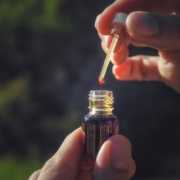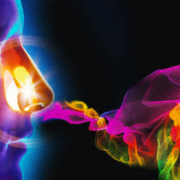Smell and Sleep: How Scents Impact Sleep
Sleep is essential for every human life. If you want to feel amazingly refreshed and energized the following day, you just need a good night’s rest with seamless, comforting sleep. Your body and mind get a chance to clean up your entire biological system, which is critical for optimal health and well-being, so you feel refreshed, recharged, and energized naturally.
While good-quality sleep is crucial for humans, it is affected by many different factors and elements, such as light, sound, room temperature, bedding, and even how close you are to your phone. Most of us are aware of that. But what is mostly overlooked is the connection between smell and sleep.
In this article, we’ll explore the role of scents in sleep quality according to science, along with how some scents can help with sleep disorders. So, let’s get started.
Table of contents
-
The connection between smell and sleep: an overview
-
The science of smell
-
The role of scents in sleep quality
-
Scents and sleep disorders
-
Practical applications
-
Personalizing your scent experience
-
FAQs
The connection between smell and sleep: an overview
The links between smell and sleep are significant topics of interest in continuing research today. Knowing more about what has been revealed so far is important to make informed decisions to make your bedroom ambiance more conducive to better sleep.
The connection between smell and sleep is typically bidirectional, meaning smell affects sleep quality, and sleep affects the sense of smell. Studies have shown that this is because the olfactory system, responsible for controlling the sense of smell, is regulated by the same part of the brain that is also involved in managing sleep, including emotional processing, sleep latency, and duration.
A decent number of studies showed that smell significantly impacts sleep in several ways, ranging from affecting the time it takes to fall asleep to influencing emotional processing to regulating overall sleep quality.
The science of smell
How olfaction works
The sense of smell, otherwise called olfaction, transforms chemical stimuli, tiny odorant molecules released by the substances that have a smell, into electrical signals or impulses. Then, they are directly sent to the brain through the olfactory nerve for interpretation. This happens through some sequential steps:
First, tiny aroma molecules released by odorous substances enter the nose and move to the top of the nasal cavity, where the olfactory epithelium is situated.
Second, special cells called olfactory receptors are found in the olfactory epithelium. Aroma molecules bind to these receptors, causing olfactory sensory neurons to depolarize and generate electrical signals or impulses.
Third, these electrical signals or impulses are sent to the brain through olfactory nerve cells for interpretation.
Finally, the brain assesses the impulses and recognizes the smell.
The brain’s response to scents
The brain’s response to scents employs different parts of the brain, including:
- The olfactory bulb – impulses are created, and initial processing of the smell occurs here.
- The olfactory cortex – also called piriform cortex. Smells are detected here.
- The amygdala – this part of the brain is involved in yielding emotions.
- The hippocampus – this part of the brain is involved in storing and organizing memories.
Various factors, including behavioral state, current context, past experience, and emotional responses can impact the brain’s response to scents. Emotional responses can be either positive, such as pleasure and relaxation, or negative, like helplessness and guilt.
The role of scents in sleep quality
Scents can have both positive and negative effects on sleep quality. Certain pleasant scents can help you sleep better, while some unpleasant scents may disrupt sleep quality.
Positive effects of certain scents
Lavender: the calming aroma
Lavender has been shown to have significant calming effects on the body and mind, making it an ideal scent for promoting better sleep. It can also help reduce stress, anxiety, pain, and heart rate.
In a 2005 study, researchers found that lavender oil can help increase the percentage of deep or slow-wave sleep in both men and women. Furthermore, all participants reported higher energy the morning after exposure to lavender, supporting the concept that the increased sleep quality was fully restorative (1).
Chamomile: the relaxing herbal scent
The relaxing herbal scent of chamomile has been used in aromatherapy for centuries to enhance feelings of relaxation and facilitate sleep quality. Due to its proven therapeutic benefits, chamomile is among the most popular scents for sleep.
In a 2022 randomized controlled trial (RCT), scientists concluded that chamomile essential oil can help promote sleep quality in people with mood disorders, especially anxiety, depression, and sleep disorders (2).
Vanilla: the comforting fragrance
Vanilla is well-known for its tremendous comforting effects. Emerging research shows that the scent of vanilla has significant soothing and calming effects. These can help lower anxiety and stress levels and promote the feeling of calmness and relaxation, making it an ideal tool for improving sleep.
Vanilla’s effects are quite similar to lavender’s. A 2019 animal study showed that inhaling vanilla can help reduce pain and induce a sense of relaxation (3).
Negative effects of unpleasant scents
While pleasant scents can positively affect sleep by promoting relaxation and more restful sleep, unpleasant scents can have adverse effects that can decrease sleep quality and even awaken some people.
In a 2022 study on the “reciprocal relationships between sleep and smell”, researchers found that the modulation of scent perception during sleep significantly modulates sleep. Both good and bad odors can affect the duration of sleep, the latency to sleep onset, and overall sleep quality (4).
Common disruptive odors
Studies have shown that foul odors can disrupt sleep, induce negative dreams and emotions, affect attention, and even cause insomnia in some individuals. Some common disruptive odors may include but are not limited to, smoke, rotten foods, smelly feet, and gut-wrenching smells.
Impact on sleep patterns
Unpleasant scents have been found to negatively impact sleep patterns. Bad odors can affect sleep onset and overall sleep quality, meaning they can negatively impact how long it takes to fall asleep, decrease sleep quality and might cause wake-ups in some individuals.
Scents and sleep disorders
Aromatherapy is the use of scents, particularly those derived from plants, to improve various aspects of health. Forms of aromatherapy are based on the use of essential oils, liquids prepared with natural ingredients extracted from different parts of plants such as flowers, resins, fruits, leaves, and roots.
Many essential oils are used to promote sleep quality, particularly in aromatherapy. Numerous evidences suggest the potential positive effects of aromatherapy on sleep and its associated disorders.
How aromatherapy can aid insomnia
Insomnia is a common sleep disorder characterized by difficulty falling and staying asleep. It may affect moods, focus, and energy levels, which can impact daily activities, work, and quality of life. Studies have shown that aromatherapy can be used as a safer and more effective natural treatment option for insomnia compared to conventional sleep medications.
A 2021 study investigating the effect of lavender essential oil aromatherapy on sleep quality shows that lavender aromatherapy can help improve sleep quality in patients with sleep disorders induced after heart surgery. This study indicates the potential benefits of aromatherapy in insomnia and other sleep disorders (5).
Scents for reducing nightmares and anxiety
Several scents may help reduce nightmares and anxiety. Some scents that are known for promoting relaxation and calmness and lowering stress and depression may help promote sleep quality and lower the risk of developing nightmares and anxiety.
Some scents that are known for reducing nightmares and anxiety may include:
- Jasmine
- Geranium
- Bergamot
- Chamomile
- Lavender
- Sweet marjoram
- Cedarwood
- Rose
- Sandalwood
- Valerian root
Practical applications
Tips for incorporating beneficial scents into your sleep routine
Incorporating beneficial scents into your sleep routine can be an effective but simple way to promote better sleep. You can incorporate your favorable scents into your sleep routine in many ways. Whether you can consider using diluted essential oils topically or an aroma diffuser to create a sleep-inducing atmosphere, it’s important to choose only pure, high-quality natural scents and also to consider using them in moderation so that they cannot overwhelm your senses.
Scented pillows and bedding
Another great idea is using scented pillows and bedding. Spray your pillows and bedding with natural perfumes that have soothing, calming, relaxing, and comforting effects. You can create your DIY pillow and bedding scents by mixing a drop of essential oils and water into a spray container.
Creating a sleep-inducing environment
When you’re ready to create a sleep-inducing environment, you might consider choosing scents such as lavender and chamomile, which are known for their calming effects on the body and mind. These scents can help promote feelings of relaxation and calmness and reduce anxiety and stress, making them highly useful in creating a peaceful ambiance conducive to sleep.
Personalizing your scent experience
Finding your ideal sleep scent
People react differently to scents, and everyone’s choices and preferences are unique. Some might discover that a specific scent is beneficial for them in getting to sleep faster and better, while others might find a different scent helpful. So, finding out which scent works best for you is important.
Experimenting with different aromas
Experiment with different aromas of essential oils. Popular essential oils for sleep may include Chamomile, Lavender, Sandalwood, Rose, Neroli, Cedarwood, and Jasmine just to name a few. Try out different aromas and be bold enough to experiment with them until you find the ones that work best for you.
FAQs
What are the best scents to promote better sleep?
Some of the best scents that can help promote better sleep may include:
- Lavender
- Chamomile
- Rose
- Geranium
- Jasmine
- Bergamot
- Sweet marjoram
How do different scents affect sleep quality?
The sense of smell is regulated by the same area of the brain that controls sleep quality. Hence, scents have a powerful impact on sleep, and these effects can be both positive and negative.
Some pleasant scents such as lavender, chamomile, vanilla, cedarwood, rose, and jasmine can help enhance sleep quality in several ways, including:
- Reducing anxiety levels
- Calming the nervous system
- Lowering blood pressure
- increasing relaxation and mood
- Reducing snoring symptoms by clearing airways
- Reducing the time of falling asleep
Conversely, unpleasant scents, such as smoke and rotten foods, can make it difficult to fall asleep.
Can certain scents help with insomnia?
Stress and anxiety often contribute to developing insomnia and other related sleep disorders. Some scents with significant calming and relaxing effects can help reduce anxiety, stress, and depression and may also help with insomnia. They may include Lavender, Vanilla, Rose, geranium, Roman Chamomile, Bergamot, Neroli, Jasmine, and Sandalwood just to name a few.
Are there any scents that should be avoided before bedtime?
Some scents are associated with increased alertness and an energized brain. These scents may disrupt sleep and should be avoided before bedtime. They may include lemon, orange, peppermint, petitgrain, and rosemary.
How do scents influence the sleep-wake cycle?
The science behind how scents influence the sleep-wake cycle is quite complicated and involves the limbic and olfactory systems of the brain. Scents can affect various factors of the sleep-wake cycle, including sleep quality, sleep onset, memory, dreams, mood, wake-up, and several physiological responses like breathing and heart rate.
Further reading and resources:
- Goel, Namni, et al. “An Olfactory Stimulus Modifies Nighttime Sleep in Young Men and Women.” Chronobiology International, vol. 22, no. 5, Jan. 2005, pp. 889–904, https://doi.org/10.1080/07420520500263276.
- Cui, Jieqiong, et al. “Inhalation Aromatherapy via Brain-Targeted Nasal Delivery: Natural Volatiles or Essential Oils on Mood Disorders.” Frontiers in Pharmacology, vol. 13, no. 13, 12 Apr. 2022, https://doi.org/10.3389/fphar.2022.860043.
- Ueno, Hiroshi, et al. “Comprehensive Behavioral Study of the Effects of Vanillin Inhalation in Mice.” Biomedicine & Pharmacotherapy, vol. 115, no. 108879, 1 July 2019, p. 108879, www.sciencedirect.com/science/article/pii/S075333221930616X#:~:text=Vanillin%20does%20not%20affect%20cognition,
- Gaeta, Giuliano, and Donald A Wilson. “Reciprocal Relationships between Sleep and Smell.” Frontiers in Neural Circuits, vol. 16, 22 Dec. 2022, www.ncbi.nlm.nih.gov/pmc/articles/PMC9813672/, https://doi.org/10.3389/fncir.2022.1076354.
- Ebrahimian, Abbasali, et al. “Effect of Lavender Aromatherapy on Sleep Quality and Physiological Indicators in Patients after CABG Surgery: A Clinical Trial Study.” Indian Journal of Critical Care Medicine, vol. 25, no. 4, 2021, pp. 429–434,
https://doi.org/10.5005/jp-journals-10071-23785.
https://amerisleep.com/blog/how-smell-affects-your-sleep/
https://www.sleepfoundation.org/bedroom-environment/how-smell-affects-your-sleep
https://www.sleepcycle.com/how-to-fall-asleep/smelling-sleepy-how-scents-can-improve-your-sleep/
https://pubmed.ncbi.nlm.nih.gov/16298774/
https://pmc.ncbi.nlm.nih.gov/articles/PMC9041268/
https://pubmed.ncbi.nlm.nih.gov/31035009/

























Leave a Reply
Want to join the discussion?Feel free to contribute!